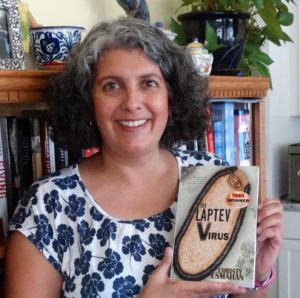Vetusta Morla
This blog post is dedicated to my late Tia Gloria who left the world last week. She was loved and will be missed.
Have you ever become obsessed with a singer or band (in a good way)? I have, several times in my life. Billy Joel was the first one that I clearly remember. Years later, after seeing Jason Mraz in concert, I couldn’t get enough of his songs. The ABBA tunes in both Mama Mia movies were my latest obsession, especially during the Covid lockdown. And now, it’s Vetusta Morla, a Spanish Indie Rock Band. They are phenomenal!
The band, composed of six guys, is named after a character in Michael Ende’s The Never Ending Story. The young men, who have been friends since high school, created their band right here in Tres Cantos, the city where I live, in 1998. Small world!
What’s more, the former owners of the apartment I live in are the aunt and uncle of the band’s drummer, who calls himself El Indio. The former owners’ son, El Indio’s cousin, was the person who told us about the group when we were looking to purchase our home. It turns out that El Indio used to practice in his aunt’s (what is now our) storage room in the basement before Vetusta Morla came to be.

©Carolina Sánchez
That unique connection is what first got my attention, but the band has come a long way from its humble beginnings, with some of their songs now boasting more than a million monthly listeners, according to Spotify. They’ve won 17 musical awards and have been written up in the world-renowned Rolling Stone magazine several times. And just this past spring one of their songs, El Amor de Andrea featured in the movie with the same name, was nominated for best original soundtrack for the Goya prize (the prestigious annual Spanish cinematographic award).
So, what’s so special?
They are versatile and talented musicians who write and perform their own original songs that are both catchy and deeply lyrical. When I was speaking to friend from Salamanca about the group, she said that one of the things she loved about them was that they were basically poets who put their poetry to music.
So let me give you a taste of their music by linking a song at a time and discussing them. Then I’ll share my entire Vetusta Morla Spotify playlist at the end. By clicking on the song title, you can listen to the song on Spotify. As you get to each song, you can listen to the whole thing or only the first minute, to get the feel.
We’ll begin with Copenhague which, as one of their first songs, has been listened to the most, according to Spotify. Notice the lovely guitar introduction. The song reminds me of summer. You can even hear gulls calling at one point and for a few seconds there is the sound of a radio, as if it was coming from a neighbor’s house.
The lead singer of Vetusta Morla is called Pucho. Doesn’t he have a terrific voice? It’s masculine and yet he manages to hit the high notes so well. It’s a distinctive voice that adds to the uniqueness of the band’s sound. And he enunciates very well, which makes it great to listen to if you are trying to improve your Spanish.
Two of the other band members, El Indio and Guillermo, also provide backup vocals, which you’ll hear in some of the songs. Their voices are a great contrast and support to Pucho’s.
If you like drums, the intro to this song, called La Deriva is really fun. See what you think!
Some of their songs make me want to dance when I hear them. That’s the case with Valiente. Listen to the first 15 seconds (at least) and you’ll see what I mean. And as the song goes on it just gets more fun! This is one of the songs I often wake up hearing in my mind because it’s such a catchy tune.
When my husband listens to music he often just tunes into the song’s rhythm and the sounds of the instruments, while ignoring/not noticing the lyrics. But for me, a song’s lyrics are often an integral part of enjoying it.
So, let’s cherry-pick a few lyrics from another of my favorite songs by Vetusta Morla called 23 de junio (June 23rd). Although the song references an important summer holiday here in Spain called San Juan (Saint John’s Eve is the 23rd of June), to me the notes and lyrics of this song conjure up a feeling of All Hallow’s Eve. Listen to the first minute of the song and see if you agree.
Now let’s look at what they are saying (and please note that none of the translations in this blog are official translations, they are just my translations so you can enjoy):
Antes del frío, levanta las velas (Before the cold sets in, take out the candles)
Guarda en tu falda los granos de arroz (Stash some grains of rice in your skirt)
Y haz ceremonias de Luna llena (And perform ceremonies to the full moon)
Antes del frío, lánzamelos (Before the cold sets in, toss them to me)
Spooky, right? Later the song changes and talks about leaving your baggage behind, at the water’s edge, so you can be seen as you wish to be seen. And then he says, go ahead and jump in, I’ll be waiting here for you. Yeah. I’m sure I´m not doing the lyrics justice, but they are really good.
Another song I really like is called Consejo de Sabios, which translates to “Council of Wise Men.” It’s got a lovely keyboard intro. Listen to it and then come back.
Here’s a brief translation of the first part of the song, (skipping a couple of lines that I don’t exactly understand.) Again, I’m translating only a part of the song as the entire thing would be too long and I just want to whet your appetite. This song is about a relationship that is falling apart, and as you can hear by the tone of voice Pucho uses in the beginning, it’s about someone who is sad and trying to figure things out, but sometimes, there’s not much you can do to save a relationship that’s so far gone.
Antes de hacerlo estallar (Before blowing it all to pieces)
Quiero que aguantes mi mano (I’d like you to hold my hand)
Dime si el pulso es constante (Tell me if you can feel my pulse, and if it’s steady)
O es un murmullo lejano (Or if it’s just a distant whisper)
[…]
Es pronto para la amnesia (It’s too soon to forget)
Y tarde para irnos intactos (And too late to come through unscathed)
¿Qué hay que hacer? (What’s to be done?)
¿Qué hay que hacer? (What’s to be done?)
Ahora que todo está hablado (Now that everything has been said)
Lo intenté, lo intenté (I tried, I tried)
Whew! I almost want to cry with the deep despair that reverberates through in this song.
Now for another one. When I teach Spanish, I often encourage my students to listen to music as it helps hone pronunciation skills and gives them a bunch of new vocabulary. Here’s a fun song called Sálvase Quien Pueda (Save Yourself, If You Can) that is full of verbs in their infinitive form. We’ll only look at the first 3 stanzas. It’s also about a relationship that is in trouble.
Puedo volver, puedo callar (I could leave, I could shut up)
Puedo forzar la realidad (I could distort reality)
Puedo doler, puedo arrasar (I could feel pain, I could crush/be crushed)
Puedo sentir que no doy más (I could feel like I can give no more)
Puedo escurrir, puedo pasar (I could slip by, I could ignore)
Puedo fingir que me da igual (I could pretend that I don’t care)
Puedo incidir, puedo escapar (I could repeat my mistake, I could escape)
Puedo partirme y negociar la otra mitad (I could throw away half of myself and negotiate the other half)
Puedo romper, puedo olvidar (I could break up, I could forget)
Puede comerme la ansiedad (I could be worried sick)
Puedo salir, puedo girar (I could leave, I could turn around)
Puedo ser fácil de engañar (I could be easy to fool)
Yes, what a great song!
Another one my husband and I really love is called Los Días Raros. It starts out softly, with just the keyboard, and then a tiny bit of percussion, gradually adding Pucho’s soft voice. It builds up and then at just past 2 and a half minutes in, it suddenly stops. When it resumes a couple of seconds later, it’s soft again, like a heartbeat, and slowly builds back up. Ah! It’s really a work of art.
Let me leave you with a couple more songs that I love: Los Buenos has a pretty guitar intro and it’s one I’m often humming throughout the day.
Maldita Dulzura is also great.
Finisterre, is also the name of the western-most city in continental Spain. The city’s name comes from Latin, “finis terrae”, meaning the end of the earth because it was once thought to be the last piece of land before the world ended, i.e. if you sailed any further you would fall off. As a play on words, the song is about how the singer no longer cares if the world ends (“… whether the forests burn or the ocean boils”) as long as his girl is around.
Remember the song I mentioned right at the beginning, that was nominated for the Goya award? It’s called El Amor de Andrea. and was done in collaboration with Valeria Castro, an up-and-coming Hispanic singer. She sings the first part of the song, and then Pucho joins her. It’s a gorgeous song.
Cuarteles de Invierno is another really nice song. And the list goes on! I’m leaving out a lot of good ones, believe me! But this blog was already too long.
Vetusta Morla just put out their 6th album, called Figurantes at the end of May, 2024, and I’m excited to hear their new songs!
Well, what do you think? Aren’t they amazing? If you want to hear my Vetusta Morla playlist, here’s the link. I’m missing a few songs, but I’ll add them as I can. Happy listening!
I hope you enjoyed this blog post. I haven’t written for over a year, so I hope you don’t mind how long this one was. And as always, please check out (and tell someone about) my novels here.



2 comments
Have just started listening to their music – I like it! Nice blog Chisty! Connie
Author
Thanks, Connie!! Hugs!